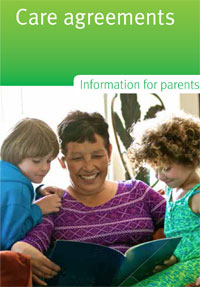Care agreements
A care agreement is an agreement between our department and a child's parents to place their child or young person for a short period of time in the care of someone other than the parents.
This type of agreement can be used when we are not sure that a child will be safe at home and when parents are willing to work with our department to resolve any child protection concerns. Depending on their age and maturity, we must obtain and consider the views of the child or young person before entering into a care agreement, and a child can be a party to the care agreement.
There are two types of Care Agreements:
- Assessment care agreement - this can be used when we are investigating and assessing child protection concerns to determine if a child or young person is in need of protection. We can ask parents to sign this type of care agreement for up to 30 days (only) and during this time the parents will still have the ability to make short and long term decisions about their child. We can enter into this agreement with the consent of only one parent if we have tried but it is impractical to obtain the consent of the other parent. If a parent refuses to enter into an assessment care agreement then we cannot commence it with only one parent’s agreement. It must be in writing with certain things outlined in the agreement. It must be signed by both parents.
- Child protection care agreement - this can be used when we have assessed that a child or young person is in need of protection. Parents can agree to this type of care agreement for an initial period of 30 days. The agreement can be extended for a further six periods of 30 days with the parent's consent. It must be in writing with certain things outlined in the agreement. It must be signed by both parents.
During the period of the child protection care agreement, our department will have legal custody of the child or young person.
However, parents can tell us which day-to-day decisions they would like to be involved with.
Parents retain the right to make significant decisions about their child or young person as they will still be the guardian.
- Last reviewed
- 6 June 2018
- Last modified
- 3 August 2023
 This work is licensed under a Creative Commons Attribution 4.0 International (CC BY 4.0) licence
This work is licensed under a Creative Commons Attribution 4.0 International (CC BY 4.0) licence


